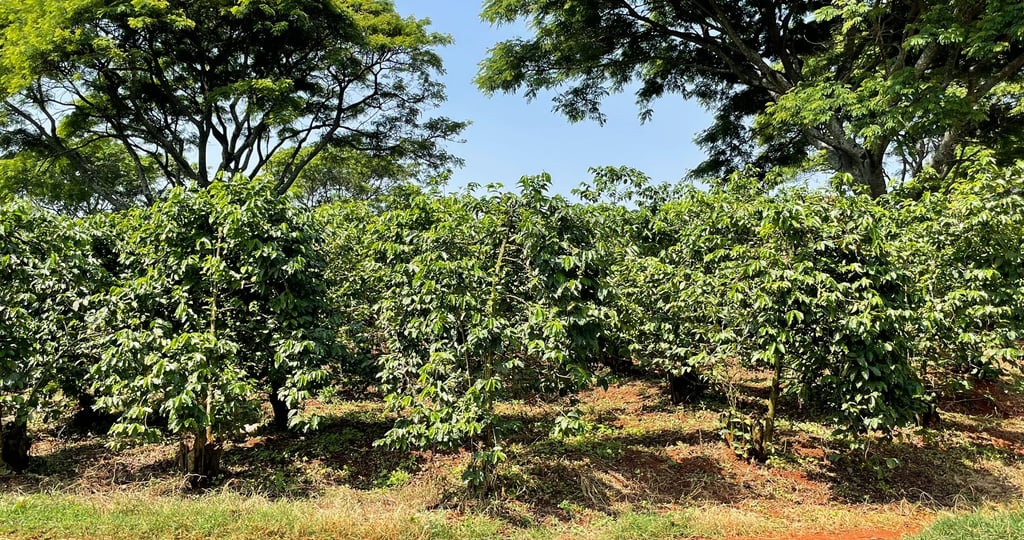Sustainable Coffee Farming in Kenya
Intercropping and sustainability in Kenyan coffee farming
COFFEE FARMING
Andiee M
12/10/20242 min read


Intercropping and Sustainability
A Game-Changer for Kenyan Coffee Farming
Kenya, renowned for its premium coffee, has long been a leader in producing high-quality beans favored worldwide. However, the coffee industry faces challenges, from fluctuating global prices to the environmental impact of monocropping practices. Amid these challenges, intercropping offers a sustainable solution to revitalize Kenyan coffee farming while improving farmers' livelihoods.
What is Intercropping?
Intercropping is the agricultural practice of cultivating two or more crops together on the same piece of land. In the context of coffee farming, it involves planting coffee trees alongside compatible crops such as bananas, beans, or maize. This synergy creates a diverse ecosystem that benefits the soil, the environment, and the farmer.
Benefits of Intercropping in Coffee Farming
Enhanced Soil Health
Monocropping often leads to soil nutrient depletion. Intercropping, on the other hand, allows for nutrient cycling. For example, legumes like beans fix nitrogen in the soil, enriching it for coffee trees and other crops.Increased Resilience to Climate Change
With unpredictable weather patterns becoming the norm, intercropping provides a buffer. Shade-providing crops like bananas protect coffee plants from excessive heat, while ground cover crops reduce soil erosion during heavy rains.Diversified Income Streams
Coffee farmers often face financial strain when coffee prices dip. Intercropping with food crops or fruits provides an additional source of income or sustenance, ensuring farmers are less dependent on a single crop.Reduced Pest and Disease Pressure
Diverse crops create a less hospitable environment for pests and diseases that thrive in monoculture systems. This reduces the need for chemical pesticides, lowering costs and minimizing environmental harm.Improved Biodiversity
Intercropping fosters a vibrant ecosystem that supports pollinators, beneficial insects, and soil microorganisms. This enhances both the productivity and sustainability of the farm.
Real-Life Success Stories
In regions like Murang’a , Nyeri and Kiambu, Kenyan farmers have embraced intercropping with bananas and coffee. This combination has been particularly successful, as bananas not only provide shade but also generate steady income. Similarly, farmers incorporating beans into their coffee farms have reported improved soil fertility and higher yields.
Challenges and Solutions
While intercropping holds immense potential, it requires knowledge and careful planning.
Challenge: Competition for resources like water and nutrients.
Solution: Selecting complementary crops with different root depths minimizes competition.
Challenge: Lack of technical expertise among farmers.
Solution: Capacity-building programs by agricultural extension officers and NGOs can equip farmers with the necessary skills.
How Intercropping Aligns with Sustainability Goals
Kenya has committed to achieving several Sustainable Development Goals (SDGs), including eradicating poverty and combating climate change. Intercropping aligns with these goals by promoting environmental conservation, increasing food security, and providing economic benefits to rural communities.
Furthermore, sustainable practices like intercropping enhance the global reputation of Kenyan coffee, appealing to conscientious consumers who prioritize ethically sourced products.
The Future
For intercropping to reach its full potential in Kenyan coffee farming, collaboration is essential. Farmers, cooperatives, government bodies, and private sector players must work together to provide resources, training, and market access.
By embracing intercropping, Kenyan coffee farmers can sustain their livelihoods, protect the environment, and ensure that the next generation inherits a vibrant coffee industry. This ancient yet innovative practice is more than just a farming technique—it's a pathway to resilience and sustainability.
Let’s raise our cups to a brighter future for Kenyan coffee, brewed from the grounds of sustainability!

